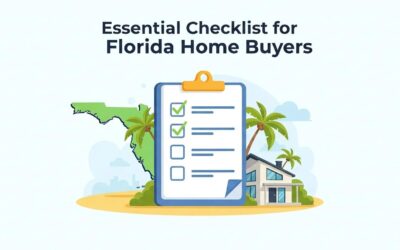The prospect of purchasing a home, particularly in the picturesque state of Florida, has long been considered an integral aspect of the American Dream. The allure of sandy beaches, warm weather, and diverse cultural experiences make owning property in this region highly desirable for individuals seeking to establish roots or invest in real estate. However, potential homeowners often need help with significant financial barriers due to stringent down payment requirements that hinder their ability to enter this dynamic market.
These individuals need to explore alternative methods and strategies that can enable them to secure a piece of Floridian paradise without compromising their fiscal stability.
Aspiring homeowners daunted by exorbitant upfront costs can turn to innovative financing options available within real estate acquisition. These alternatives present viable solutions for those eager to plant their stakes in the Sunshine State while circumventing traditional down payment obligations.
By delving into programs such as USDA Rural Development loans, VA loans designed specifically for military personnel and veterans, local housing assistance initiatives, and various seller-financing arrangements, buyers can access a wealth of resources to facilitate seamless transitions into property ownership with minimal capital investment.
This article tries to explain these advantageous opportunities and help prospective purchasers with valuable guidance derived from years of expertise in the Floridian real estate domain.
Exploring Usda Rural Development Loans
Purchasing a home in Florida with no money down may seem impossible; however, an option could make this dream a reality. Enter the United States Department of Agriculture (USDA) Rural Development Loan program, which offers 100% financing to eligible borrowers for properties in designated rural areas.
To determine USDA loan eligibility, prospective buyers must meet specific income requirements and have a credit score that meets or exceeds the lender’s standards. The first step towards securing a USDA loan is conducting a rural property search using tools provided by the USDA on their website. This resource allows potential homebuyers to input their desired location and receive information about whether the area qualifies as ‘rural’ according to the USDA guidelines.
Remember that while certain regions may appear to be urban or suburban at first glance, they can still qualify under these parameters due to population density and economic development levels. Once confirmed that the desired property falls within an eligible rural zone, applicants should research approved lenders offering Florida USDA loans.
These financial institutions will help navigate the application process efficiently and provide guidance on any additional requirements necessary for approval. With determination and thorough preparation, achieving homeownership without putting any cash down is indeed possible via this government-backed mortgage program. The journey toward obtaining a zero-downpayment residence does not end here; explore another viable alternative: navigating VA loans for military personnel and veterans.
Navigating VA Loans For Military Personnel And Veterans
While USDA Rural Development Loans offer a viable solution for buying a home with no money down, another option to consider is the VA Loan program. Some may argue that these loans are only available to military personnel and veterans; however, it is essential not to overlook this potential resource if you or your spouse has served in the Armed Forces.
The Department of Veterans Affairs offers various mortgage options through private lenders designed explicitly for service members and their families. The key advantages of securing a VA loan include:
- No down payment required
- Favorable interest rates compared to traditional mortgages
- No private mortgage insurance (PMI) is needed
- Less stringent credit requirements could lead to higher approval rates
- Military benefits such as financial counseling and support throughout the process
Individuals must determine their VA loan eligibility to take advantage of these opportunities. This typically involves obtaining a Certificate of Eligibility (COE), which verifies one’s history of military service. Once eligible, applicants can work alongside approved lenders who will guide them through the application process.
Prospective buyers must research different lender offerings thoroughly, as specific terms and conditions may vary significantly between institutions. There are numerous reasons why exploring VA loans should be an integral part of any comprehensive strategy when seeking homeownership with no money down in Florida. These loan programs not only provide financially accessible pathways but also recognize and reward those who have dedicated themselves to serving our country.
As potential homebuyers continue researching all available alternatives, they should remember that local housing assistance programs might further alleviate financial burdens by offering additional resources tailored to individual needs.
Seeking Local Housing Assistance Programs
Purchasing a home with no money down in Florida may seem like an impossible dream for many potential buyers. However, various affordable housing programs and community resources are available to assist individuals and families in achieving this goal. These programs offer financial assistance, such as grants or low-interest loans, that can help cover the required down payment or closing costs associated with purchasing a home.
By accessing these valuable resources, aspiring homeowners can navigate their way toward property ownership without saving substantial funds.
One practical approach is researching local housing authorities and non-profit organizations within Florida’s desired region or city. Many entities provide affordable housing initiatives targeted at first-time homebuyers and those who meet specific income requirements. Such agencies often work collaboratively with government-sponsored enterprises, such as Fannie Mae or Freddie Mac, facilitating access to financing options designed exclusively for program participants.
Additionally, some municipalities have established community land trusts to preserve long-term affordability while fostering feelings of belonging among residents by creating stable neighborhoods where people from diverse backgrounds live harmoniously.
A crucial aspect of using these advantageous programs involves thoroughly researching eligibility criteria and application processes before embarking on the house-hunting journey. This proactive approach will enable prospective homebuyers to identify appropriate opportunities that align with their unique needs and circumstances, thus increasing their chances of success in purchasing a home with minimal upfront capital investment.
As one delves deeper into understanding how local housing assistance programs operate, exploring alternative financing arrangements available for buying properties becomes essential – one such option being seller-financing agreements.
Understanding Seller-Financing Arrangements
In light of seeking local housing assistance programs, another alternative worth considering is seller-financing arrangements. These are agreements in which the property owner finances the buyer’s purchase instead of a traditional mortgage lender. Delving into this option could provide an avenue for purchasing a home with no money down in Florida.
Understanding seller-financing arrangements entails recognizing both their advantages and potential risks. Key aspects include:
- Advantages of seller financing: This method can offer flexible terms, reduced closing costs, and faster transaction times compared to conventional loans from financial institutions.
- Seller financing risks: Buyers may face higher interest rates or less favorable loan terms due to limited competition among sellers offering this financing arrangement. Additionally, there can be legal complications if the contract is improperly structured.
- Due diligence: It is crucial for buyers interested in pursuing seller financing to conduct thorough research on the property, its market value, and any existing liens or encumbrances before entering such an agreement.
- Legal counsel: Both parties should consult real estate attorneys experienced in crafting these contracts to protect their rights and interests.
Exploring the dynamics of seller-financing arrangements provides prospective homeowners a unique opportunity to secure homeownership without relying on traditional lenders. However, this route necessitates careful evaluation and planning by all involved parties to avoid potential pitfalls associated with unconventional lending practices.
The ability to successfully navigate through seller-financed opportunities depends largely upon evaluating your financial readiness and options thoroughly before engaging in negotiations with sellers who offer these types of arrangements – thus paving the way toward achieving one’s dream home ownership goals within Florida’s vibrant real estate landscape, while also ensuring that the terms of the agreement are sustainable and beneficial for all parties involved in the long run.
Evaluating Your Financial Readiness And Options
As a lighthouse guides sailors to their destination, evaluating one’s financial readiness and exploring available options illuminate the path toward homeownership in Florida.
A vital component of this assessment is understanding credit scores and how they impact mortgage eligibility. The strength of an individual’s credit score indicates borrowing reliability, with higher scores reflecting more excellent trustworthiness in repaying debts. In many cases, aspiring homebuyers with low or non-existent down payments may still have access to attractive mortgage options if they possess solid credit profiles.
Navigating the myriad of mortgage options can be daunting; however, it is essential for potential buyers seeking no-money-down solutions in Florida’s real estate market.
Government-backed loans such as the United States Department of Agriculture (USDA) Rural Development Loan program and VA Loans from the U.S. Department of Veterans Affairs offer qualified applicants zero-down payment mortgages. Similarly, conventional loan programs such as Fannie Mae’s HomeReady® Mortgage and Freddie Mac’s Home Possible® Mortgage cater to eligible borrowers who lack substantial savings for upfront costs but maintain strong credit histories.
The journey toward purchasing a home without a down payment requires diligence and dedication on behalf of every prospective homeowner. Evaluating personal finances allows individuals to gauge affordability while examining various financing alternatives empowers them to choose wisely among accessible paths forward.
With in-depth knowledge about credit scores’ significance and diverse mortgage options tailored to unique circumstances, becoming part of Florida’s vibrant communities becomes more attainable than ever – even without initial cash reserves ready for investment into property ownership dreams.
Frequently Asked Questions
Are There Any Specific Credit Score Requirements For Obtaining A No-Money-Down Mortgage In Florida?
Credit eligibility is crucial in obtaining no-money-down mortgage alternatives in Florida, as lenders typically seek assurance regarding the borrower’s ability to repay the loan.
Specific credit score requirements may vary depending on the type of mortgage program; for instance, USDA loans and VA loans are two popular options that offer zero down payment opportunities but have different minimum credit score thresholds.
Generally speaking, higher credit scores increase the likelihood of securing favorable terms and interest rates, while lower scores might necessitate additional qualifications or limitations.
Prospective homebuyers should research various mortgage programs available within Florida’s real estate market and consult with lending experts to determine which option best aligns with their financial circumstances and aspirations for homeownership.
What Are The Potential Drawbacks Or Risks Of Buying A Home With No Money Down In Florida?
Venturing into the world of no-money-down home purchases in Florida can be akin to navigating a minefield. At the same time, it may appear lucrative, but various downside risks and investment challenges lie beneath.
One significant drawback is that buyers will likely face higher monthly mortgage payments without an initial down payment due to increased loan amounts and potentially elevated interest rates. This financial strain could lead to difficulties making timely payments, causing negative impacts on credit scores and heightened risk for foreclosure.
Furthermore, with no equity built up through a down payment, homeowners may find themselves underwater if property values decline or stagnate – a situation where the outstanding balance on their mortgage exceeds the current market value of their home.
In addition, obtaining financing for zero-down mortgages often requires meeting stringent eligibility criteria such as high credit scores and stable income sources.
Prospective buyers must carefully weigh these potential pitfalls against the allure of achieving homeownership without upfront capital outlay when considering no-money-down options within Florida’s dynamic real estate landscape.
How Do Property Taxes And Homeowners Insurance Factor Into A No-Money-Down Home Purchase In Florida?
In purchasing a no-money-down home in Florida, prospective homeowners must consider property taxes and insurance costs as crucial factors that can significantly impact their financial responsibility.
To help mitigate these expenses, buyers should explore available property tax exemptions, such as homestead exemptions or exemptions for specific populations such as seniors or veterans.
Additionally, seeking insurance discounts through measures like installing security systems or storm-resistant features may contribute to reducing premiums.
By understanding the potential savings from these strategies, individuals will be better equipped to navigate the complexities of owning a home in Florida while fostering a sense of belonging within their desired community.
Are Any Additional Or Hidden Fees Associated With No-Money-Down Mortgage Options In Florida?
In the pursuit of no-money-down mortgage options in Florida, potential homebuyers should remain vigilant about hidden costs and mortgage pitfalls that may arise.
As real estate experts in Florida, educating clients on these unanticipated expenses, including higher interest rates, additional closing costs, or private mortgage insurance premiums, is essential.
Furthermore, specific loan programs with low down payment requirements might necessitate borrowers meeting specific eligibility criteria such as income limits or purchasing within designated areas.
By addressing these concerns proactively, experienced and first-time homebuyers can confidently navigate the complexities of securing their dream residence while fostering a sense of belonging within their chosen community.
Can I Qualify For More Than One No-Money-Down Mortgage Program, And If So, Can They Be Combined To Help Cover The Full Cost Of The Home?
In the realm of no-money-down mortgage options, prospective homebuyers can qualify for multiple programs and combine them to cover the total cost of a property.
However, program eligibility requirements vary significantly, and applicants must thoroughly understand each option’s criteria before exploring potential combinations.
Combining various financing sources can be a practical approach to achieving homeownership without an upfront down payment; nevertheless, aspiring homeowners in Florida must consult with experienced real estate professionals who can provide tailored guidance regarding available programs and their specific stipulations.
This collaborative strategy ensures home buyers are well-equipped to make informed decisions while seeking financial assistance through diverse channels within the complex landscape of no-money-down mortgages.
Wrap-Up: Essential ConsiderationsConclusion
In conclusion, purchasing a home with no money down in Florida can be an attractive option for those who need help saving up for a substantial down payment.
However, it is crucial for potential buyers to carefully consider the various factors involved in such transactions and weigh the benefits against the potential drawbacks or risks associated with these mortgage programs.
As a double-edged sword, no-money-down mortgages can facilitate homeownership but may entail higher monthly payments, additional fees, and increased financial vulnerability.
Therefore, thorough research and consultation with real estate and lending professionals are essential when considering this path toward owning property in the Sunshine State.







